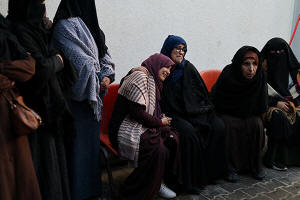Israeli tanks batter hospital districts in Gaza's Khan Younis, displaced
set to flee southward
 Send a link to a friend
Send a link to a friend
 [January 25, 2024]
By Fadi Shana, Nidal al-Mughrabi and Dan Williams [January 25, 2024]
By Fadi Shana, Nidal al-Mughrabi and Dan Williams
GAZA/DOHA/JERUSALEM (Reuters) -Israeli tanks bombarded areas around two
hospitals in Gaza's main southern city Khan Younis on Thursday, forcing
displaced people into a new desperate scramble for safe shelter,
residents said, in an offensive Israel says is targeting Hamas
militants.
Gaza health officials said at least 50 Palestinians had been killed in
Khan Younis in the past 24 hours, including two children in an Israeli
air strike that hit a residential home.
The city is now encircled by Israeli armoured forces and under almost
non-stop aerial and ground fire, residents say, and a huge mushroom-like
column of smoke billowed skyward from areas of Israeli military
operations on Thursday.
Palestinian medics said Israeli tanks had cut off and were shelling
targets around the city's two main still-functioning hospitals, Nasser
and Al-Amal, trapping medical teams, patients and displaced people
sheltering inside or nearby.
Israel says Hamas militants use hospital premises as cover for bases,
something the Islamist group and medical staff deny.
The Israeli military's siege of Khan Younis' main hospitals, in what it
calls an escalating campaign to eliminate militants in Hamas' main south
Gaza stronghold, has made it near impossible for rescue crews to reach
the wounded or collect the dead.
Most of the Gaza Strip's 2.3 million population is now squeezed into
Khan Younis and towns just north and south of it, after being driven out
of its northern half earlier in Israel's blitz of the Hamas-ruled
territory, now in its fourth month.
The fusillade from advancing Israeli forces forced many displaced people
to set out again in search of ever dwindling places of safe shelter,
medics and residents said.

On Wednesday, the United Nations said Israeli tanks struck a large U.N.
compound in Gaza sheltering displaced Palestinians, killing at least
nine people and wounding 75. But Israel denied its forces were
responsible, suggesting Hamas might have launched the shelling. It said
it was reviewing the incident.
Israel said Hamas had "command and control centres, outposts and
security headquarters" in the vicinity, which it described as "a dense
area" with civilians as well as the premises of several hospitals where
it said militants were active.
DISPLACED PEOPLE SET TO FLEE UN COMPOUND
On Thursday, thousands of displaced Palestinians who had taken refuge
from Israeli shelling in the U.N. compound were preparing to flee to
Rafah, 15 km (nine miles) away on Gaza's southern edge.
Israeli forces had set a 5 pm local time (1500 GMT) Friday deadline for
the UN compound to be evacuated, according to residents and local
journalists at the site. There was no immediate comment from the Israeli
military.
Juliette Touma, chief spokesperson for the U.N. agency for Palestinian
refugees in Gaza, confirmed the report, estimating there are more than
30,000 displaced persons crammed inside.
At least 25,700 people have been killed in Gaza, one of the world's most
densely populated and widely impoverished places, Palestinian health
officials say, with large tracts of the heavily built-up enclave
flattened by Israeli bombing.

[to top of second column]
|

Relatives of Palestinian man Abdulraheem Al-Saloot, who died of a
heart disease and did not receive treatment he needed due to the
worsening health conditions at Nasser hospital, according to his
family, react at al-Najjar hospital, amid the ongoing conflict
between Israel and the Palestinian Islamist group Hamas, in Rafah in
the southern Gaza Strip January 24, 2024. REUTERS/Ibraheem Abu
Mustafa

Israel unleashed its war to eradicate Hamas after militants stormed
through the border fence in a shock incursion into nearby Israeli
towns and bases on Oct. 7, killing 1,200 people and seizing around
240 hostages.
The Israeli military said on Thursday it had killed more than 9,000
Hamas militants and lost 220 soldiers in 3-1/2-month-old war.
Reuters was unable to verify the figures.
In its latest update, the Israeli military said forces had carried
out raids with precision air strikes and snipers to take out
multiple Hamas command centres and militant emplacements in Khan
Younis, including the Al Amal district.
"In close-quarters combat, the soldiers eliminated the terrorists,
and various weapons were discovered in the process," it said in a
statement.
'HUMANITARIAN PAUSE' TALKS SNAGGED
Urgent international appeals for a ceasefire to spare civilians who
have borne the brunt of casualties have fallen on deaf ears with
Israel vowing not to relent until Hamas has been eradicated and all
hostages freed.
Hamas says any deal must hinge on Israel ending its offensive and
siege and withdrawing from the Gaza Strip.
Mediated talks on a month-long truce that could see hostages freed
in swaps for Palestinian prisoners in Israel have resumed, but have
snagged on the two sides' differences over how to bring an end to
the war, sources told Reuters.
The International Committee of the Red Cross said less than 20% of
the narrow enclave - around 60 square km (23 sq miles) - now
harboured over 1.5 million people in the south, "where the dramatic
escalation of fighting threatens their survival".
Gaza health ministry spokesman Ashraf Al-Qidra said Nasser Hospital
was running at only 10% of capacity in "harsh and frightening
conditions", having run out of food, pain killers and anaesthesia
medications.
In north Gaza, residents said they had almost completely run out of
food, especially flour, and have been grinding down livestock feed
to replenish it.
Video footage from Gaza City's al-Zeitoun district in the north,
verified by Reuters, showed hundreds of people fleeing from an aid
distribution point as gunfire crackled nearby.

The U.N. World Food Programme said earlier this week very little
food aid had made it beyond south Gaza since the start of the war
and pockets of the enclave remained at risk of famine.
Gaza's conflict threatens to destabilise the Middle East, stoking
hostilities ranging from the Israeli-occupied West Bank to the
Israel-Lebanon border region, Syria, Iraq and Red Sea shipping lanes
crucial to international trade.
In the West Bank, the Palestinian health ministry that exercises
limited self rule there, said at least 370 people had been killed in
Israeli army raids or clashes since Oct. 7.
(Reporting by Nidal al-Mughrabi in Doha, Fadi Shana in Gaza, Dan
Williams in Jerusalem, Jonathan Saul in London; writing by Mark
Heinrich; editing by Sharon Singleton)
[© 2024 Thomson Reuters. All rights reserved.]This material
may not be published, broadcast, rewritten or redistributed.
Thompson Reuters is solely responsible for this content. |